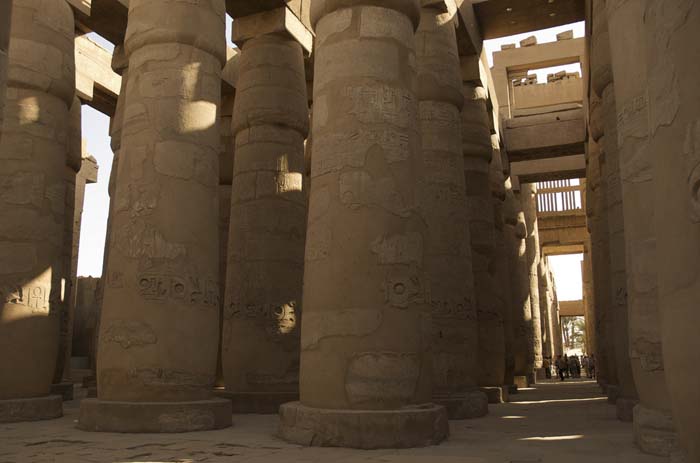Unlike many other countries where everyone was either a peasant or a nobleman, Egypt had a very large middle class. These people tended to live in cities or on small country estates. They made a decent amount of money from skilled labor, so they could afford to buy food and other items instead of making it themselves.
Middle class laborers were often men who could afford to support a family, so all middle class women did not work like lower class women did. However, some women worked alongside family in shops or ran their own business.
Craftsmen
Craftsmen were responsible for most of the beautiful goods that Egypt is known for in modern times. They made the sculptures and beautiful gold jewelry that was found in Egyptian tombs. A craftsman who made fine goods for the nobility was very well off, but even more common craftsmen who made cooking pots or wove clothing lived a comfortable life. Most craftsmen resided in cities and sold their items in family shops or at markets.
Merchants
Many ancient Egypt jobs centered around trade with other cities and nations. Some merchants bought fine wares and traveled in caravans to sell them. Others built shops to sell acquired goods in a single location. Merchants typically accepted payment in coins, but they would also sometimes accept barter goods like beer or food.
Architects
Being an architect was one of the very highly respected ancient Egypt jobs because architects had to study mathematics and physics before starting their trade. If an architect managed to get a government contract for a prestigious civic project, he could even join the upper class. Most architects learned the trade from their parents, but others learned how to plan buildings and roads through an apprenticeship.
The Great Hypostyle Hall, Temple of Amun, Karnak
Jobs Done by Upper Class Egyptians
Upper class Egyptian noblemen were sometimes so wealthy that they could just survive on the profits of their land that was worked by farmers. However, many other upper class people still needed jobs in ancient Egypt. They prospered in prestigious and well paying jobs.
Military Officers
Life as a common soldier may not have been very pleasant, but being a military officer was another matter. Second sons of noblemen who could not inherit often chose to join the military.
During times of peace, they were often sent to oversee government projects or just live in barracks. In war time, a devoted and bright military man could quickly rise in the ranks. Generals were so well-respected that some became pharaoh eventually.
Scribes
People who could write in the complicated Egyptian hieroglyphs were highly sought-after. Anyone who could afford the scribe school fee could enter the school and learn how to write. After passing extensive exams, scribes could work for the government, write books, write letters for noblemen, or write coffin texts for gravesites.
Statue of a Seated Scribe, displayed at the Louvre
Government
The vast Egyptian bureaucracy needed a lot of workers to run efficiently. A vizier collected taxes and reported directly to the king. Most villages were run by a governor or overseer who reported to the vizier. Huge armies of scribes worked underneath overseers to keep records of taxes and laws.
Priests
Priests were often the wealthiest members of upper class Egyptians. They received a portion of all sacrifices and ofte lived in luxury. However, being a priest came with some risks. If the god you served became unpopular, your temple could be destroyed and you would be destitute.
Interesting Facts About Jobs in Ancient Egypt
- Most Egyptians followed in their parents footsteps and took over the family business.
- Many farmers went to work for the Pharaoh as builders or soldiers while the Nile was flooded each year.
- If a commoner managed to get a position like “artist of the Pharaoh” or “doctor of the Queen,” they were basically set for life and immediately became a member of the upper class.
- Priests were allowed to marry, and often passed down their position to their child.
- Bureaucrats were expected to be very polite and follow rigorous etiquette at all times. This is where the term “civil servant” originates from.
